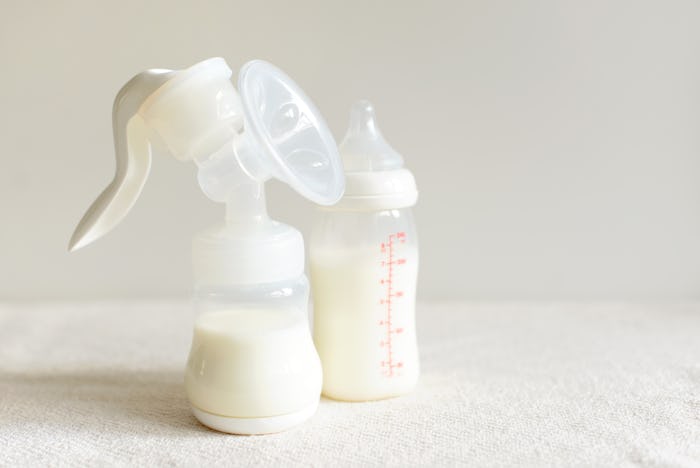Life

Here's What Can Really Happen To Breast Milk Left Out More Than 4 Hours
When you're spending precious time pumping breast milk out of your exhausted mom bod, it can sometimes be tempting to just leave the milk right there in the bottle you pumped into and do nothing else with it. Something comes up, so you decide to leave it out for a few hours because your lactation consultant told you that breast milk can sit out safely for approximately four hours. But, do you know what happens to breast milk after four hours?
Now, you might be wondering why anyone would be so careless with the liquid gold that they took time out of their day (or night) to pump. Imagine you're at work where finding space in the always crowded fridge filled with everyone's leftover takeout can be a struggle, and your boss is begging you to get back in time for a staff meeting. In this situation, you could be tempted to throw caution to the wind and leave that bottle out for the few hours you have left in your day. If you're at home, you might so busy taking care of that adorable baby and chasing down your toddler that you may forget all about your freshly pumped milk as you tend to more pressing matters. The bottom line is that life sometimes happens.
"Breast milk, like any food, can grow bacteria if it sits out at room temperature too long," Danielle Downs Spradlin, IBCLC, CLC with Oasis Lactation Services explains to Romper. "Breast milk handling is pretty similar to other food handling. Just like we sniff leftovers, smelling breast milk is a good indicator that it's not fresh any more."
According to the Center for Disease Control and Prevention (CDC) guidelines for safe breast milk handling, breast milk can be left at room temperature for four hours. "Some parents may notice that the milk gets smelly faster. Room temperature is defined as 77 degrees Fahrenheit or below, so a car or in a purse while out at the park on a breezy day may actually be quite warmer than it seems," Spradlin says.
If you leave breast milk out longer than the four-hour safety window allows for and then feed it to your baby, there is a chance that there could be consequences for your babe. According to Kristin Gourley, IBCLC Manager at Lactation Link LLC, your baby could get sick if they consume breast milk that has been left out too long. "The likelihood is small — our current recommendations are actually pretty conservative, but it's best to be safe when it comes to our babies," she tells Romper.
Even though the chances of illness may be low, it is still important to understand what may occur if you leave breast milk out longer than four hours and then use it to feed your baby. "Feeding an infant potentially spoiled breast milk may lead to gastrointestinal illness," certified lactation consultant and co-founder of Imalac, tells Romper "You can check your milk by doing a smell and taste test —milk that has spoiled has a distinctive foul odor and taste. However, it is possible for the milk to be harboring harmful bacteria before it completely spoils. Many infants who consume spoiled milk will simply throw it back up. If you see your baby squirming/rejecting the milk, do not feed it to them. If your infant does regurgitate spoiled milk, keep an eye on them to see if vomiting persists and if so, call your pediatrician."
Another point to consider is the type of bacteria that may exist and grow in breast milk if it is left out for longer than four hours. "One contaminant that is hard to think about is fecal matter. We are constantly changing diapers and hand hygiene is crucial," says Spradlin. "While breast milk has anti-infection properties, it's full of nutrients that babies and bacteria can use to grow."
Understanding how breast milk that has been left out over four hours can affect your baby is crucial, but all babies are different. "Please note these recommendations are for a term non-compromised healthy baby. Recommendations could be different for a preterm or medically fragile infant," nurse and lactation consultant Angie Natero tells Romper. So, if you have a child with certain conditions, it is best to consult your pediatrician about what considerations to make for your child where breast milk storage is concerned.
"I teach moms the 'rule' of 4-4-6 to help them remember these storage guidelines," Natero says. "Freshly expressed breast milk can be stored at room temp for up to four hours, in the fridge for up to four days, and in the regular freezer for up to 12 months, but ideally try to use it by month 6." Following these guidelines helps ensure that your babe stays happy and healthy.
This article was originally published on